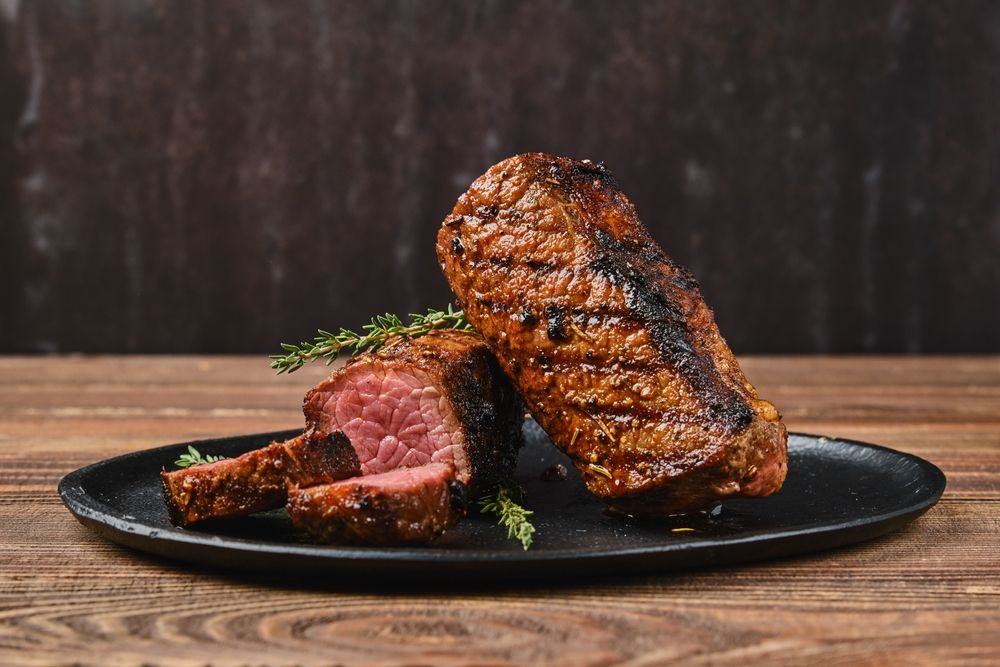
Beef, pork, lamb, venison, and even goat meat all fall under the "red" category of meats, which are pink or red when raw and darker when cooked. These animal products are rich in key nutrients like protein, iron, and vitamin B12—and if you're a meat eater, you probably find them quite tasty. Savory, juicy, and full of flavor, red meat is a favorite among Americans. Statistics show that in 2021 alone, Americans consumed approximately 111.5 pounds of red meat per capita. Given this large amount, you might wonder what happens to your body if you're eating red meat every day.
However, there are reasons why plant-based eating is on the rise. Experts have historically urged the Dietary Guidelines for Americans to provide more concrete recommendations around red meat consumption, and public health organizations like the World Cancer Research Fund recommend limiting red meat to no more than three servings per week. Despite red meat's many nutrients, the news isn't entirely positive—especially when not consumed in healthy moderation.
While the news about red meat isn't entirely negative, being aware of the potential benefits and side effects of daily consumption can help you make an informed decision about your diet. With that in mind, here are some possible effects of eating red meat every day. For more healthy eating tips, be sure to check out What Happens to Your Body When You Eat Salad Every Day.
You'll reap the health benefits of protein

Meats like beef and venison are among the highest-protein foods available. For example, a 3-ounce serving of deer meat contains 26 grams of protein, while 4 ounces of ground beef provide 23 grams. Since the Daily Value for protein is 50 grams, incorporating these meats into your daily diet can help you meet your protein goals.
Your cholesterol may go up

Cholesterol, including both LDL (the "bad" kind) and HDL (the "good" kind), is a crucial indicator of cardiovascular health. As this waxy substance builds up in your blood vessels, it can narrow the space for oxygen-rich blood to travel, potentially causing blockages that lead to heart attacks or strokes.
Unfortunately, consuming burgers or chops every day can negatively impact your cholesterol levels. Red meat, in particular, is notorious for raising LDL cholesterol. Research from Oxford University found that the risk of coronary heart disease increased by 18% for every 50 grams of processed red meat consumed daily, and by 9% for every 50 grams of unprocessed red meat.
You may increase your risk of type 2 diabetes

It may seem like type 2 diabetes is solely related to carb intake, given its impact on blood sugar regulation. However, proteins like red meat can also influence the development of type 2 diabetes. A 2014 study in Nutrients found that meat consumption was consistently associated with an increased risk of type 2 diabetes. Researchers speculated that this could be due to red meat's potential to increase inflammation, raise body weight, or increase visceral fat—all known factors in diabetes development.
Conversely, a 2022 study that assessed 21 randomized controlled trials found that red meat did not affect type 2 diabetes risk factors such as insulin resistance and pancreatic beta cell function. Until further research provides more clarity, it may be wise to reduce red meat consumption if you're at risk of diabetes. To make blood sugar-friendly choices, check out our list of the 50 best foods for people with diabetes.
You could feel more energized

Protein isn't the only nutrient superstar in beef, pork, lamb, and venison. Red meat is also rich in vitamin B12 and iron. While you might not think much about these micronutrients beyond seeing them listed on your multivitamin, they play a significant role in your health. Both are crucial for maintaining energy levels, and a deficiency in either can lead to fatigue and weakness. In other words, eating red meat every day could help prevent feelings of sluggishness.
You may increase your risk of colorectal cancer

Another downside of a daily red meat habit is the increased risk of contracting colorectal cancer. Research over the last few decades, including a 2015 study by the Department of Medical Oncology at Istanbul University published in Oncology Reviews, suggests a link between higher consumption of meats like beef, pork, and lamb and a greater likelihood of this bowel disease.
It's important to note that not all red meats have the same effects. While red meat does increase the risk, processed red meats have an even greater impact on colon cancer development. According to the WHO's International Agency for Research on Cancer, red meat is classified as a group 2A carcinogen, meaning it is "probably carcinogenic to humans." Processed red meats, however, are classified as a group 1 carcinogen, a substance known to cause cancer.
You'll feel full

Protein is exceptionally satiating, with research showing it to be the most filling macronutrient. Including red meat in your daily diet may help you feel fuller longer, potentially leading to a stable weight. Combining red meat with other satiating nutrients like complex carbohydrates and healthy fats—such as pairing lamb with quinoa or cooking pork in olive oil—can further support weight maintenance.

